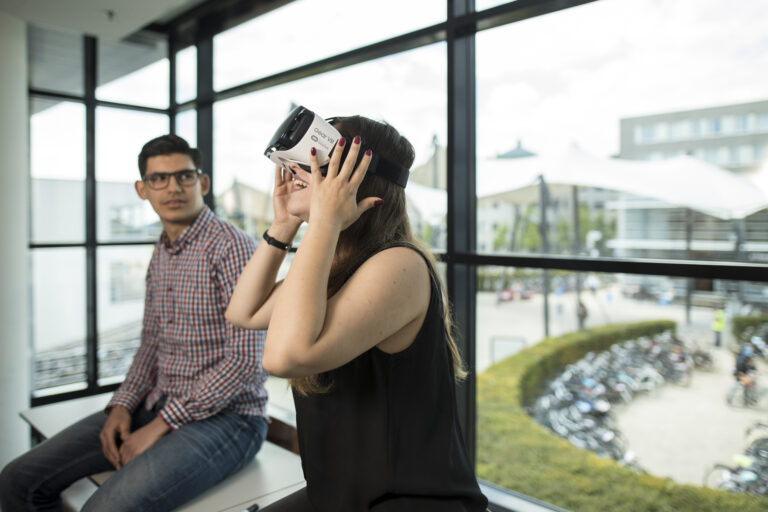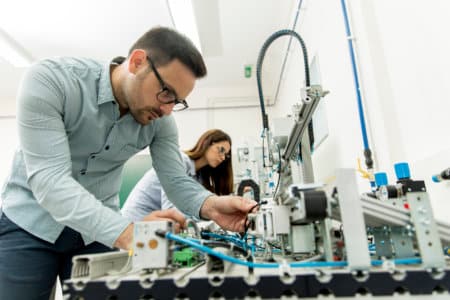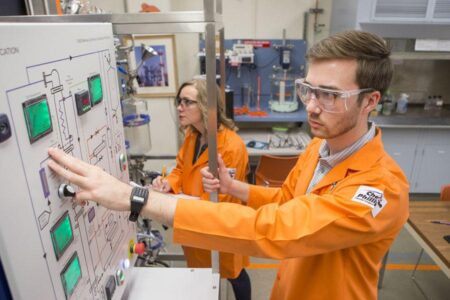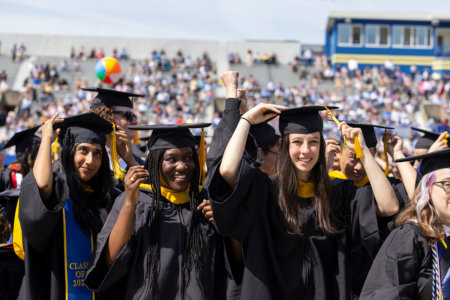
From electric cars that reduce emissions to the use of AI chatbots to boost productivity, from smart home appliances that save energy to robots that perform care work, the world we live in brims with the many possibilities of using tech for good. But for every potential it brings, there are just as many pitfalls.
The best master’s degrees in Artificial Intelligence and its related fields recognise this. They strike a balance between technical expertise and the humanities. They go beyond preparing students to create the most profitable and advanced technology — ensuring they are just as good for the people and planet as it is for the bottom line of companies. Join them — or the universities listed below — and you’re set to innovate and make a difference.

There are nine specialisations in the Master’s in Artificial Intelligence at the University of Twente. Source: University of Twente
University of Twente
Based in the friendly student city of Enschede in the east of The Netherlands, the University of Twente (UT) is a technical university that puts the people and planet first. It focuses on developing an understanding of how technology can impact society and the environment positively. This is achieved by fusing technology and engineering with behavioural and social sciences to come up with smart, innovative and people-centred solutions for today’s challenges. At the master’s level, you’ll learn how to make a difference by looking beyond the boundaries of your own discipline and joining forces with students and professors from all kinds of disciplines to tackle current issues.
UT offers several programmes that can help you become a pro in AI while making sure you know how to truly impact society in positive, inclusive and sustainable ways. For example, you can choose master’s programmes in Robotics, Computer Science, Electrical Engineering, or Interaction Technology – each includes an emphasis on AI.
Many of these programmes cover how technology affects society and impacts people’s lives and are led by leading experts in Data Science & AI, Smart Industry, eHealth, Robotics and Cybersecurity. Like UT students, many of these researchers come from all over the world.
It’s this diversity that quickly makes this 146-acre (the size of 200 football fields) campus feel like a second home. Safe, spacious and full of socialising, this is where lecturers, staff, and faculty members here know each student by name and will personally attend to your questions in and out of the classroom. Finding a place to live around the university is much easier and a lot more affordable compared to other student cities in the country as well. In Enschede, you can either rent an apartment or studio privately or live your student life to the fullest by renting a dormitory room. UT offers a lot of information and ensures you get a smooth start to your UT student journey. Visit the University of Twente’s study choice calendar to learn more about its programmes.

Master of Science (MSc) in Human-Centred Artificial Intelligence at Technical University of Denmark explores the rapid development of AI technology and its benefits. Source: Technical University of Denmark
Technical University of Denmark
The Technical University of Denmark (DTU) is internationally recognised in technical and natural sciences. The university believes in technology as a means of necessary change that will further improve people’s lives. Lecturers, researchers, and students here collaborate to create and develop technologies that work in a globalised world, transcending social and cultural differences.
The Master of Science (MSc) in Human-Centred Artificial Intelligence explores the rapid development of AI technology and where it is beneficial and applicable to the public. This master’s degree lets you work on your own projects, participate in existing research, and get involved in computer media. You can choose to specialise in either AI and Cognition, Machine Learning at Scale, Social Media, Mobile Apps and Data Science, User Experience / Mobile Health / Personal Informatics, Computer Vision and Computer Graphics, or Computer Games.
Whichever you choose, you get to work closely with faculty members and lecturers. You stand on equal footing with them, removing unnecessary barriers in your pursuit of knowledge.
“The most surprising thing about DTU is that there is very little distance between you as a student and the professors. They give you a lot of room to challenge what they say, so you learn to challenge knowledge,” student Amy Fitzpatrick says. “What makes me proud to be a DTU student is seeing the success of projects coming out, all these social enterprises, and new innovative ideas.”

source: Université Grenoble Alpes
Université Grenoble Alpes
The Université Grenoble Alpes (UGA) is committed to its social and environmental responsibilities. They are passionate about fighting against climate change, raising awareness, training students, and participating in the development of technologies to cater to social demands. It is their sole objective to meet scientific and societal challenges with its extensive research and innovations in hopes of bringing a better future for us all.
A lot of this is done at the Graduate School@UGA. Take programmes like Planned Health: Physical and Numerical Methods in Health, for example. It focuses on medical physics, medical imaging, biophysics, artificial intelligence, biomedical engineering, medical devices, and nanomedicine. The goal is to use experimental methods, data and AI to innovate in the prevention, diagnostic, therapy and follow-up of chronic diseases (such as cancer, neurodegenerative diseases, epilepsy, osteo-articular diseases, and more).
GREEN: Grenoble Energy Transition Academy answers the call for sustainable development. It answers the call for a profound energy transition by bringing together three disciplines: Humanities, Social Sciences and Engineering Sciences. Those seeking to be managers, mediators, and researchers equipped to make our societies more resilient to natural, technological or social hazards can join the Risk programme. You’ll focus on the management of crises, an aspect which is not adequately covered today by other universities.
Whichever programme you choose, you’ll be ready to progress to a PhD or the professional sphere. Interested? Several forms of financial aid are available. There are scholarships to attract the best international students and funding to enable students to experience research work through internships in laboratories.
*Some of the institutions featured in this article are commercial partners of Study International










